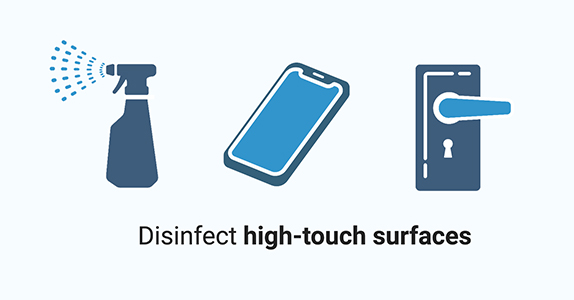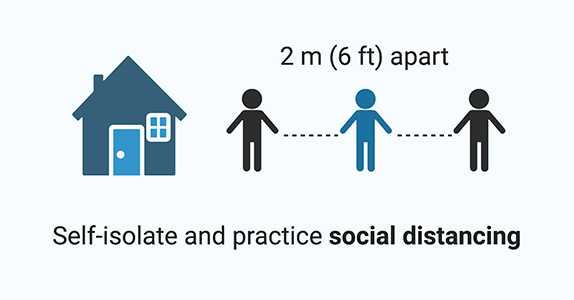Our country has never faced a crisis like this before — and it will take support from all of us to overcome it. At TGen, we are contributing experience and expertise to the effort to fight the COVID-19 coronavirus alongside private, state and federal organizations. But our number-one priority is keeping our staff and supporters healthy, and there are steps we can all take right now to reduce the spread of the virus. In addition, your financial support today will help us scale up our testing capacity while contributing to global research and an eventual vaccine for this illness.
With over two decades of experience in biomedicine and genomic technology, TGen is working side-by-side with federal, state and local agencies to combat the COVID-19 coronavirus.
Following the lifting of social restrictions and individuals returning to work, the medical profession has seen a recent spike in COVID-19 cases. Listen as TGen’s Tyler Delaughder, D.O., a TGen clinical research coordinator and recent graduate of Midwestern University, shares his interpretations of the medical issues surrounding COVID-19.
Applying over two decades of biomedical expertise and the power of DNA/RNA sequencing and related genomic technologies, TGen is working with federal, state and local government agencies, private healthcare providers and others in efforts to combat the COVID-19 coronavirus.
We invite you to join us in our efforts to combat this growing public health issue. Funding is critically important. Your gift of $50, $100 or more helps us respond to global health threats posed by emerging diseases such as COVID-19.
Without testing, we’re working in the dark. That’s why TGen is prioritizing the development of testing that will enable officials to track the spread of the COVID-19 coronavirus and how it evolves. Establishing a more accurate picture of where and how this virus has spread is also essential to developing a vaccine.
As an affiliate of City of Hope, TGen is contributing to the preclinical development of a vaccine for the novel coronavirus. Our colleagues at City of Hope have set an ambitious goal of reaching phase 1 clinical trials for a vaccine in six to eight months.




The coronavirus causing the current pandemic is one of many coronaviruses, some of which are known as human coronaviruses and cause relatively minor symptoms associated with the common cold, while others are zoonotic viruses (which come from animals) like SARS and MERS, which cause more serious, potentially deadly disease. Our current battle is with the highly contagious SARS-CoV-2 virus, which causes the COVID-19 disease, for which there is no proven treatment.
TGen is involved in many different ways: We have developed our own highly accurate PCR test to diagnose those who are infected. We are the co-founders of the new Arizona COVID-19 Genomics Union, which is working to track the virus, where cases are coming from and how it is circulating in the community, by using Whole Genome Sequencing; and TGen is looking into potential anti-viral and antibody drug treatments, and vaccines. We are also developing a serological test, a blood-plasma test, which looks for COVID-19 antibodies, and can thereby identify individuals who have been exposed to the virus and have potentially built up an immunity, at least to the current strains.
Yes, we are a clinical diagnostic lab that is providing testing for a number of entities: State of Arizona, hospitals and healthcare providers, front-line healthcare workers, tribal communities, shelters and jails. TGen does not directly accept or collect samples from the general public.
Yes. For example, TGen is working with Northern Arizona Healthcare, which has established a remote drive-up testing facility in Flagstaff. Those who are potentially infected by COVID-19 must receive a doctor’s referral to be tested; keeping those with potential infection out of doctor’s waiting rooms, and out of emergency rooms, where they could infect others.
TGen’s diagnostic test is similar to the CDC test in that it looks for a particular genetic marker that indicates the presence of virus in a patient’s sample. Unlike the CDC test, which only looks at one gene, the TGen test has improved robustness as it looks for markers in two genes.
The TGen test, which is based on our own genomic characterizations of COVID-19, and has been revalidated against the global knowledgebase of the virus and its genome, is considered highly accurate. It is highly sensitive in that it can detect less than 10 viral particles in a patient sample (most samples have millions of viruses), and so far has been shown to have 100% specificity against all known human viruses.
Even though we are testing hundreds of samples a day — we continue to have an average turn-around time of 24-48 hours.
They can access the test though their doctors and healthcare providers.
As mentioned above; yes, and yes.
The test is being administered in Arizona, but TGen can receive patient samples from most other states.
TGen has developed a substantial inventory of tests, so we do not anticipate running out.
Yes, our scale up plan is to maintain our 24-hour turnaround time. TGen has not been operating at full capacity and has instruments and processes on hand to scale up as needed.
Yes, though it is in early stages of development.
TGen North is the infectious disease division of TGen, formally called the TGen Pathogen and Microbiome Division, in Flagstaff in northern Arizona, where we study bacteria, fungi, parasites and viruses.
It will be used immediately in a variety of ways to fight this disease.
Yes. To donate, go to: https://www.tgen.org/featured-articles/covid-19-testing/
For additional information about the COVID-19 coronavirus and staying safe during this pandemic, visit one of the organizations below.